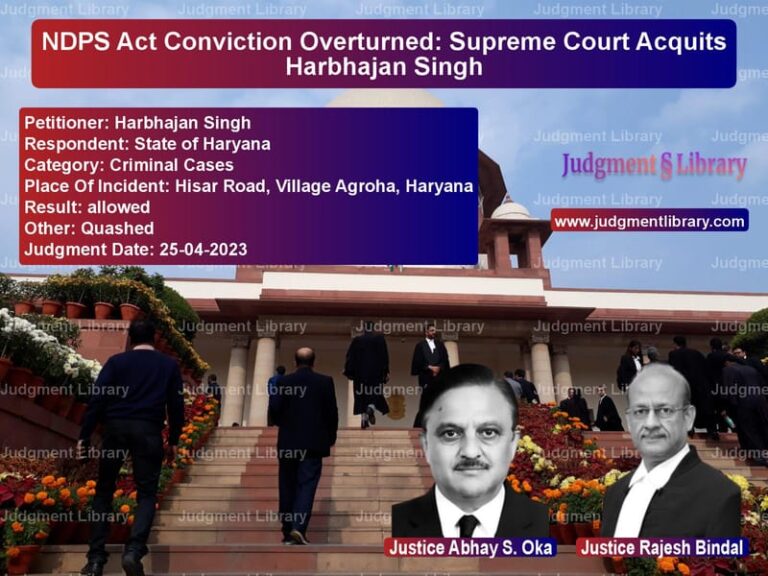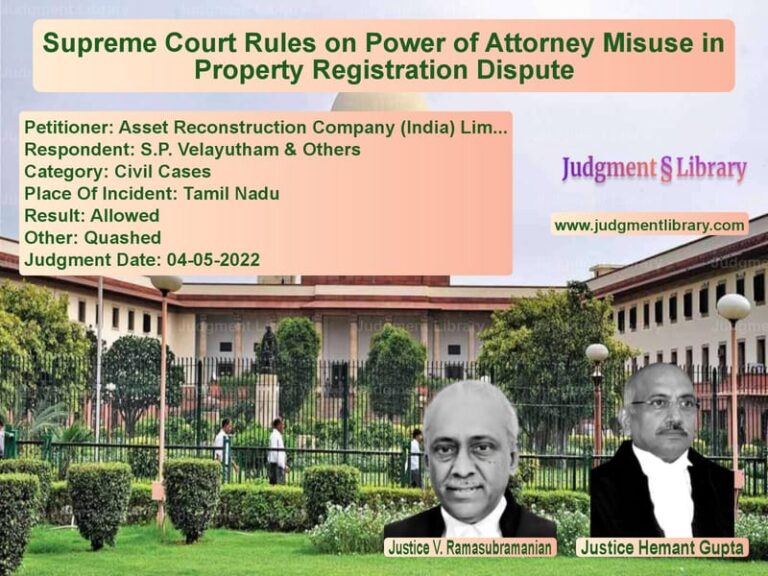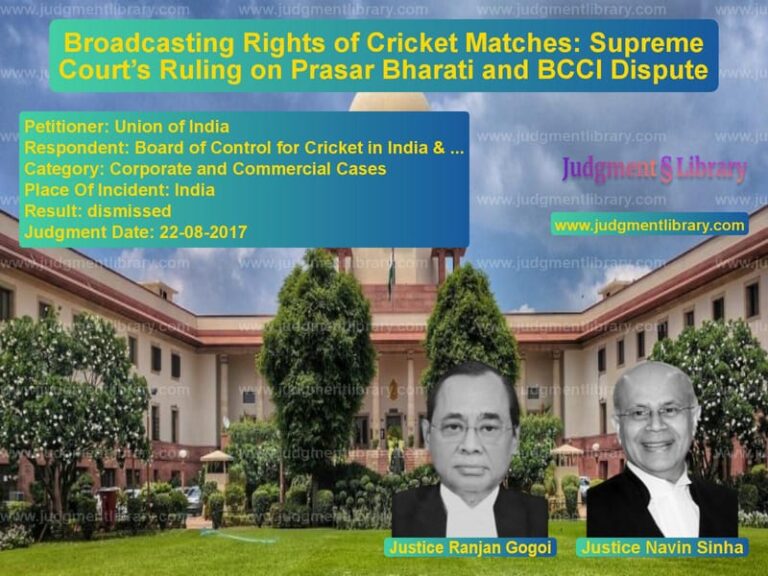Domestic Violence Case Dismissed: Supreme Court Rejects Claim for Shared Household Rights
The case of Manmohan Attavar vs. Neelam Manmohan Attavar revolves around a complex legal battle involving allegations of domestic violence, property rights, and the right to reside in a shared household under the Protection of Women from Domestic Violence Act, 2005 (DV Act). The Supreme Court ultimately ruled against the respondent, setting aside the High Court’s orders that had granted her interim relief to occupy the appellant’s residence. The decision provides crucial legal clarity on the applicability of the DV Act, particularly regarding shared household rights.
Background of the Case
The dispute involves an elderly couple – the appellant, Manmohan Attavar, aged 84, and the respondent, Neelam Manmohan Attavar, aged 62. The respondent claimed that she was in a domestic relationship with the appellant and had been abandoned after years of companionship. She sought legal relief under the DV Act, asserting her right to reside in the appellant’s property.
The respondent had previously been married to one Shri Harish Chander Chhabra, but obtained a divorce decree on October 10, 1996. She alleged that she had been in a relationship with the appellant since 1987 and that he had promised to marry her. The appellant, however, categorically denied any marriage or domestic relationship.
Key claims made by the respondent:
- She and the appellant had lived together as husband and wife in multiple residences over the years.
- The appellant had applied kumkum (a Hindu marital ritual) to her forehead in 1998, signifying marriage.
- She had resigned from her job at the appellant’s request and was financially dependent on him.
- She was entitled to reside in the appellant’s house as it was a “shared household” under the DV Act.
Legal Proceedings
Respondent’s Claims Under the Domestic Violence Act
In 2013, the respondent filed a case under Section 12 of the DV Act, seeking protection orders and residential rights. She also approached multiple authorities, including the Women and Child Welfare Department in Karnataka, claiming she had been abandoned.
The appellant challenged these claims, arguing:
- The respondent was never his wife and had no legal right over his property.
- She had never resided in the disputed property (Jayanagar, Bengaluru), and thus, it could not be considered a shared household.
- The allegations of domestic violence were baseless, and the case was filed to harass him.
Lower Court and High Court Rulings
The trial court dismissed the respondent’s application on July 30, 2015, ruling that she had failed to establish a domestic relationship with the appellant. Dissatisfied, she filed an appeal under Section 29 of the DV Act, which was transferred multiple times between different courts.
In September 2016, the Karnataka High Court passed an ex-parte order, allowing the respondent to occupy the appellant’s residence in Bengaluru. The appellant challenged this order, arguing that:
- The respondent had never lived in the property.
- The High Court wrongly assumed a domestic relationship without examining the evidence.
- The order was passed without hearing his side.
Supreme Court’s Intervention
The appellant approached the Supreme Court, filing two appeals:
- Civil Appeal No. 2500 of 2017 – Challenging the High Court’s order allowing the respondent to occupy his house.
- Civil Appeal No. 2502 of 2017 – Challenging the transfer of the appeal from the Sessions Court to the High Court.
Supreme Court’s Ruling
The Supreme Court, in its judgment, set aside the High Court’s orders, ruling in favor of the appellant. The Court made the following key observations:
1. No Domestic Relationship Established
The Court ruled that the respondent had failed to establish a domestic relationship under Section 2(f) of the DV Act. The law requires that two persons must have “lived together in a shared household” to claim protection under the Act.
“The parties have never lived together in the property in question. It is not as if the respondent has been subsequently excluded from the enjoyment of the property.”
2. No Right Over the Property
The Court examined Section 2(s) of the DV Act, which defines “shared household,” and ruled that:
- The respondent had never resided in the appellant’s house.
- She had no legal, financial, or ownership stake in the property.
3. Ex-Parte Order Was Wrong
The Court criticized the High Court for granting relief without hearing the appellant:
“The nature of the ex-parte order passed on 19.9.2016 permitting the respondent to occupy the premises of the appellant cannot be sustained.”
4. Transfer of Appeal to High Court Was Unjustified
The Supreme Court held that transferring the appeal from the Sessions Court to the High Court was unnecessary and deprived the appellant of an additional level of appeal:
“The respondent, whenever she fails to obtain a favorable order, chooses to file proceedings for transfer.”
Final Orders
The Supreme Court ruled:
- The respondent had no right to occupy the appellant’s property, and the High Court’s order was quashed.
- The appeal was transferred back to the Sessions Court for a fair hearing.
- The High Court’s intervention was unjustified and set aside.
Legal Implications
This ruling sets an important precedent in cases involving domestic relationships and property rights under the DV Act:
1. Clarification on “Shared Household”
The judgment clarifies that a property cannot be considered a “shared household” unless the claimant has actually resided there in a domestic relationship.
2. Protection Against False Domestic Violence Claims
The ruling protects individuals from false or baseless claims under the DV Act.
3. Limits on Judicial Interference
The Supreme Court reinforced that High Courts should not arbitrarily interfere in lower court proceedings.
Conclusion
The Supreme Court’s decision in Manmohan Attavar vs. Neelam Manmohan Attavar marks a significant ruling in domestic violence jurisprudence. By setting aside the High Court’s order, the Court reinforced the necessity of proving a genuine domestic relationship to claim rights under the DV Act. The ruling ensures that property rights are not misused under the guise of domestic violence claims, establishing a crucial legal precedent.
Don’t miss out on the full details! Download the complete judgment in PDF format below and gain valuable insights instantly!
Download Judgment: Manmohan Attavar vs Neelam Manmohan Atta Supreme Court of India Judgment Dated 14-07-2017.pdf
Direct Downlaod Judgment: Direct downlaod this Judgment
See all petitions in Property Disputes
See all petitions in Domestic Violence
See all petitions in Judgment by Rohinton Fali Nariman
See all petitions in Judgment by Sanjay Kishan Kaul
See all petitions in allowed
See all petitions in Quashed
See all petitions in supreme court of India judgments July 2017
See all petitions in 2017 judgments
See all posts in Civil Cases Category
See all allowed petitions in Civil Cases Category
See all Dismissed petitions in Civil Cases Category
See all partially allowed petitions in Civil Cases Category







